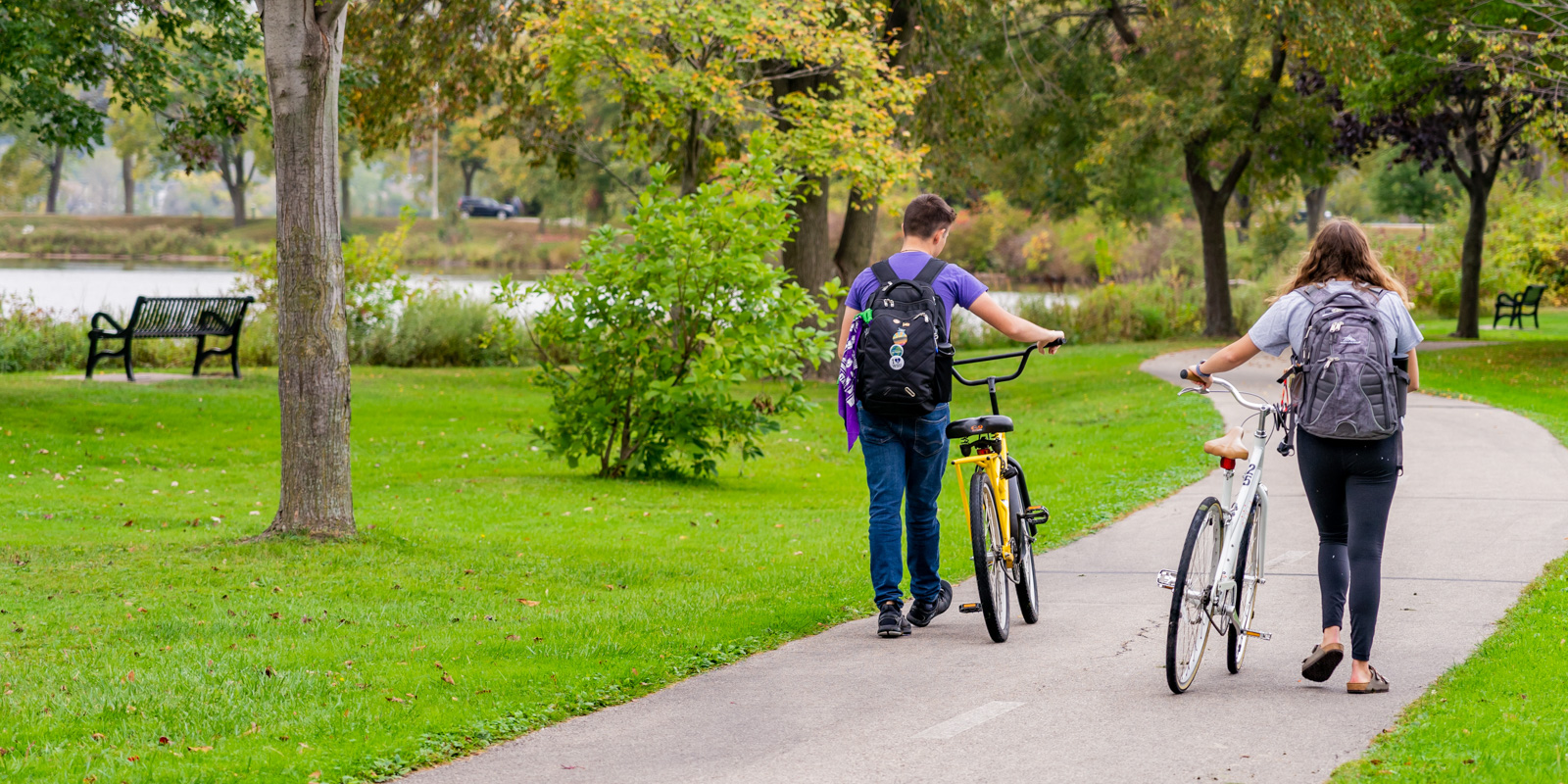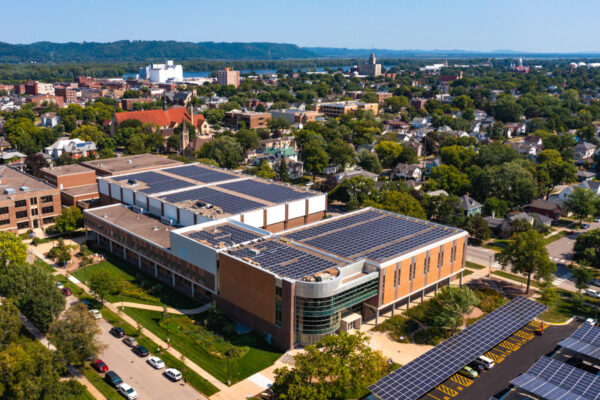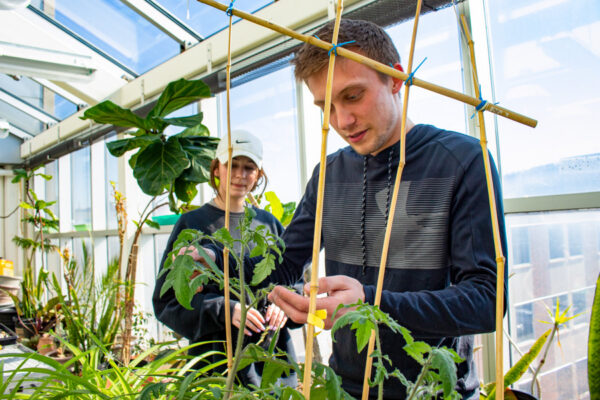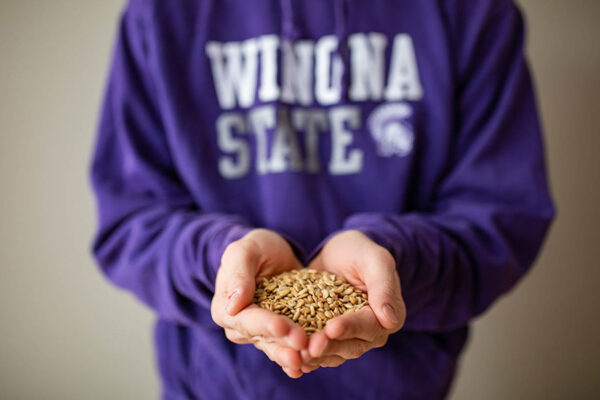
Sustainability
Winona State University is committed to building and supporting a sustainable society. From the President’s Climate Commitment to our campus infrastructure, course and program offerings, and student housing, we are working to practice and promote sustainable living.
WSU prioritizes giving our students the chance to learn about complex sustainability issues.
We provide these opportunities through a variety of classes and activities, allowing students to explore solutions and cultivate change themselves.
We integrate community work, research, learning and living in our efforts to build pathways toward a livable future for all.

Winona State’s recently installed on-campus Solar PV arrays will produce 1,700,000 kilowatt hours of electricity per year. WSU also purchases 4,800,000 kilowatt hours of electricity per year from Xcel Energy’s Renewable Connect program.
This is about 60% of our annual electricity consumption coming from renewable sources. WSU’s use of renewable energy is enough to power 600 average U.S. homes.
Participation in Renewable Connect supports an increase in renewable energy generation and takes advantage of abundant natural resources (wind and solar) with no greenhouse gas emissions while helping WSU meet its sustainability goals.
Winona State recently replaced 1,490 toilets, shower heads, urinals, and faucet aerators with water-saving fixtures and installed smart irrigation controls that use real time weather data to adjust the sprinkler cycles.
Together, these improvements reduced WSU’s water usage by over 9,000,000 gallons.
WSU’s water savings is equivalent to the average water use of 30,000 average U.S. homes.
Chartwells Dining Services continues to lead the way in sustainable food practices. Every year, Chartwells increases their efforts to positively influence the global food supply chain.
They serve cage-free eggs, Fair Trade Certified coffee and tea, rBGH-free milk, plant-based milk alternatives, as well as vegan and/or vegetarian options at every meal. They also offer reusable to go containers.
Every spring Chartwells holds a “Love Food, Not Waste” event, along with several other events throughout the year, to build student awareness of food waste.
Tower Gardens, our indoor planting systems, provides food used in various menu items, mainly in retail.
Recycling is required by Minnesota Law and is one of the easiest ways you can help the university be a good environmental steward.
We reduce the waste we produce by choosing materials wisely, reuse what we have already by considering new roles for unwanted material, recycle what must be thrown away.
In this way we minimize material bound for the landfill and increase our landfill diversion rate.
Today’s volume of transportation emits significant carbon into the atmosphere.
WSU offers a free shuttle and bikes so that students have options for travel that help lessen harmful emissions.
WSU has designated parking spots for low-emission vehicles, and has installed charging stations for electric vehicles.
WSU offers a Sustainability Minor, designed to educate students to be efficient and resourceful with today’s precious resources.
The Environmental Science Program is an interdisciplinary program sponsored by the Biology, Chemistry and Geoscience departments.
This broadly-based program is composed of:
- introductory courses
- an in-depth set of option courses in biology, chemistry, or geoscience
- a capstone experience, which involves an individual research problem and a group seminar course

The SGF is a student initiative designed to increase WSU’s effectiveness in
- integrating sustainability broadly across the curriculum and student life so that all students can advance their knowledge, skills and awareness of environmental stewardship and sustainability
- using the campus as a living laboratory by enhancing opportunities for students, faculty, and staff to work together to develop and implement solutions to campus sustainability challenges
As such, the green fee will be used primarily for campus green projects, student work, education (workshops, conferences, presentations), and outreach through the Green Action Project.

The Green Action Project (GAP) fills the gap between funds collected through student green fees and sustainability projects on campus.
Any WSU student, faculty or staff member may apply for the Green Action Project.
Applications for the Green Action Project are accepted in the fall semester with work commencing in the spring and in the spring semester for work commencing the following year. Dates may be extended for multi-year projects.
GAP submissions usually fall into two categories:
- Smaller-scale, short-term projects (less than $10,000 budget; less than one year project duration)
- Larger-scale, long-term projects (budget of $10,000 or more; project duration longer than one year)
Prior to applying, read the Green Action Project guidelines (PDF) and complete the budget form template (PDF).
The Green Action Project application will be accepted on a rolling basis with priority given to applications received prior to Oct. 30.
Past Funded Projects
Funding to host a residence hall waste reduction and recycling collection
Restoration and repair of the trailhead
Community garden construction at Maplewood Townhomes
Funding to support WSU’s first two EV charging stations and to subsidize the cost of charging for students
New containers for the main campus mall area
Questions about on sustainability practices at WSU?